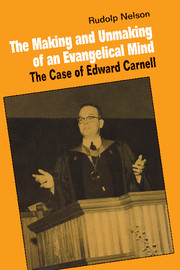V - Fundamentalism-on-the-Charles
Published online by Cambridge University Press: 10 December 2009
Summary
“My parish, with Wesley, is the world.”
Edward CarnellIn March 1940 Willard L. Sperry, Dean of Harvard Divinity School since 1922, referred in a “Dean's Letter” in the Divinity School Bulletin to the recent appearance at Harvard of a type of student quite new to that institution: “a man who has already had one theological course in a conservative-to-fundamentalist seminary, and who is now anxious to begin all over again another three years of theological re-education.” It is not clear exactly how many such students there were. Dean Sperry does number “a half-dozen in the three regular classes,” but is vague about those on upper levels (“to say nothing of the Graduate group”). More important, he seems to have some anxiety as to how the Divinity School constituency is going to react to this new development. Acknowledging that these men present an academic problem “in that they have seldom had the four years of regular college work, which we technically require for admission here,” he points out that some of them have come with an A.B. in Theology. And whatever the value of that degree, they do have certain qualities that highly commend them: “They already know their way around the major biblical and historical fields and their store of relevant facts-in-advance, awaiting reinterpretation, is much in excess of that of the ordinary college graduate.” The experience with these men, he says, has on the whole been encouraging.
- Type
- Chapter
- Information
- The Making and Unmaking of an Evangelical MindThe Case of Edward Carnell, pp. 54 - 72Publisher: Cambridge University PressPrint publication year: 1988



